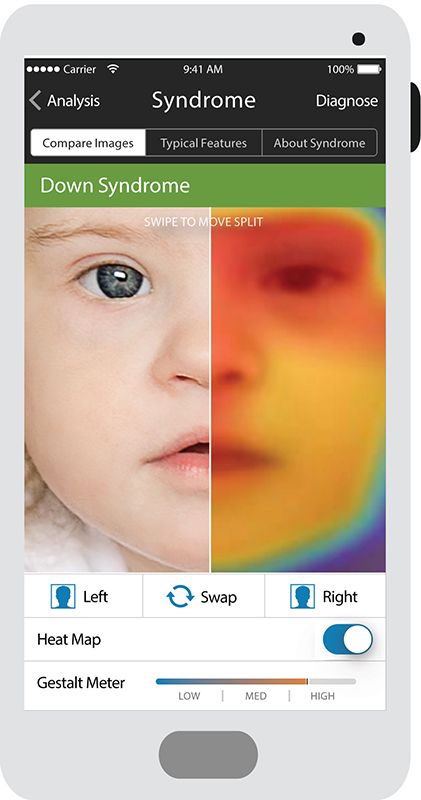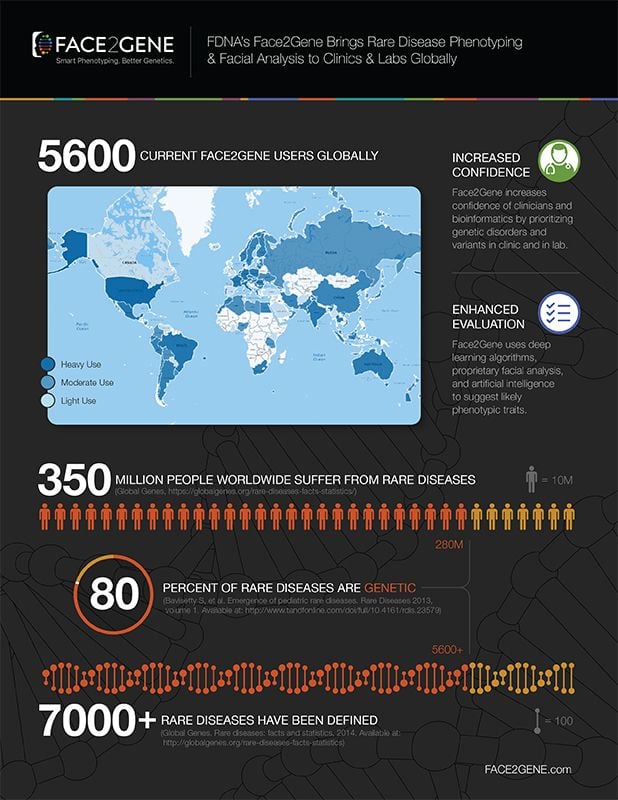This App Uses Facial Recognition Software to Help Identify Genetic Conditions
A geneticist uploads a photo of a patient’s face, and Face2Gene gathers data and generates a list of possible syndromes
/https://tf-cmsv2-smithsonianmag-media.s3.amazonaws.com/filer/d9/b6/d9b6e532-12b1-4cf9-91ff-72fa2e1d5d78/face2gene.jpg)
Omar Abdul-Rahman, a clinical geneticist at the University of Mississippi Medical Center, had been working on a diagnosis for years. A young boy, a patient of his, showed distinct facial features, and intellectual and developmental disabilities. But this is common of many genetic diseases. Abdul-Rahman ordered genetic screenings for several suspected conditions, but they were expensive and came back negative.
“When he came back for his third follow up, I started to wonder about this other condition,” says Abdul-Rahman. “But I wasn’t ready to have the family spend money on yet a third test without some degree of confirmation that we were on the right track.”
So Abdul-Rahman turned to a new tool in a geneticist’s arsenal, an app based on facial recognition software that helps identify genetic conditions based on facial features. The app suggested, with a high degree of certainty, a condition he had considered, and he ordered the test. It confirmed that the boy had Mowat-Wilson syndrome, a condition typified by seizures and heart disease as well as smaller-than-normal head size. Having a confirmed diagnosis could help the boy’s parents know how to care for him.
Face2Gene, the tool Abdul-Rahman used, was created by the Boston startup, FDNA. The company uses facial recognition software to aid clinical diagnoses of thousands of genetic conditions, such as Sotos syndrome (cerebral gigantism), Kabuki syndrome (a complicated disorder that features developmental delay, intellectual disability and more) and Down syndrome.
“When you just mention three or four traits, like upslanting eyes, depressed nasal bridge, uplifted nasal tip, or downturned corner of the mouth, that’s not really descriptive. That can be common to a lot of different diseases,” says Dekel Gelbman, CEO of FDNA. “How do you start describing patterns? There’s really no way you can verbalize that, you have to be able to classify them as a type of appearance. That’s what your brain is doing.”
Down syndrome might not be a good example; it’s relatively common, and thus well known. Most geneticists don’t need help diagnosing it. But there are more than 7,000 other genetic conditions that aren’t always so easy. The founders of FDNA, who developed the Face.com facial recognition software that Facebook bought in 2012, thought it might be possible to use similar techniques to match facial characteristics to genetic conditions.
“By curating this phenotypic information from clinicians, we’ve been able to develop a very accurate facial analysis component that is able to scan through all the image data … and compare in a number of seconds global similarities, and detect those subtle patterns associated with specific diseases,” says Gelbman.

The app is available only to clinical geneticists, and is designed solely as a tool, one of many in the arsenal of geneticists, to aid in diagnosing genetic syndromes. When Abdul-Rahman fires up the app, an outline helps him snap a photo of the patient, usually a child. The app converts that image to data, primarily based on measurements of facial characteristics such as the distance between the eyes, the length of the face, and other ratios. Thus anonymized (and HIPAA compliant), that data is uploaded to FDNA’s cloud, where it’s compared to a database of similar information. Within seconds, Abdul-Rahman will receive a list of possible conditions, as well as a metric of their likelihood.
It’s not a guaranteed diagnosis, points out Gelbman, who holds a patent (U.S. Pat. No. 9,504,428) for the system. “We’ve been very clear that this needs to be complementary to a clinical evaluation and a molecular evaluation, if available,” he says. The ultimate diagnosis depends on the geneticist, who will often order a genetic test to confirm.
Pedro Sanchez, an assistant professor at USC’s Keck School of Medicine, uses the app as a teaching tool. When talking about a genetic condition, he’ll call up an image and ask his students to describe the facial features in detail, using medical terms they need to be familiar with.
In his role as a medical geneticist at Children’s Hospital in Los Angeles, Sanchez uses Face2Gene in especially tricky, rare diagnoses. And he uses it to help families understand the diagnosis, and that there are others out there dealing with the same conditions. “This tool really helps me teach the families about a condition when I am very confident about a person’s diagnosis,” he says.
Face2Gene’s user pool has grown quickly since the app was released in 2014—more than 65 percent of clinical geneticists worldwide use it, says Gelbman—and as it grows, the tool becomes more robust. When a geneticist confirms the diagnosis of an uploaded photo, the app incorporates that in its database, creating a sort of crowdsourced loop.
“It’s all driven by data,” says Gelbman. “And the database that we’re able to curate by crowdsourcing clinical geneticists is really a one of a kind database.”
But a free tool that’s widely used by geneticists does not a business model make. The company is pre-revenue, says Gelbman, meaning investors fund its approximately 50 employees. In the coming years, the company plans to develop a revenue stream by using its database to aid pharmaceutical companies in drug discovery and trial recruitment.
“In the future, we see our technology, and the data itself, being a basis for pharmaceutical companies to develop new treatments, specifically within the landscape of precision medicine—getting better treatments to patients that can benefit better from them,” says Gelbman.
